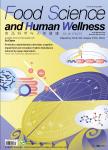Food intolerance and oligoantigenic diet in children with attention-deficit hyperactivity disorder
作者机构:Faculty of Human Sciences, University of Regensburg Department of Psychology, University of Bath
出 版 物:《Food Science and Human Wellness》 (食品科学与人类健康(英文))
年 卷 期:2023年
核心收录:
学科分类:1002[医学-临床医学] 100205[医学-精神病与精神卫生学] 10[医学]
摘 要:The hypothesis that some children with attention-deficit hyperactivity disorder (ADHD) may show sensitivity or allergic reactions to various food items has led to the development of the oligoantigenic diet. The rationale of the diet is to eliminate certain foods from the diet in order to exclude potential allergens contained either naturally in food or in artificial ingredients with allergenic properties. The oligoantigenic diet attempts to identify individual foods to which a person might be sensitive. First, ADHD symptoms are monitored while multiple foods are excluded from the diet. Subsequently, if symptoms remit, foods are re-introduced, while observing the individual for the return of symptoms. An advantage of the oligoantigenic diet is that it can be tailored to the individual. A growing body of evidence suggests that behavioral symptoms of subgroups of children with ADHD may benefit from the elimination of certain foods. The effect sizes of an oligoantigenic diet regarding improvement of ADHD symptoms have been found to be medium to large. Available evidence suggests that the investigation of the role of food hypersensitivities in ADHD is a promising avenue worthy of further exploration. Further large-scale, randomized controlled studies including assessment of long-term outcome are therefore warranted.



